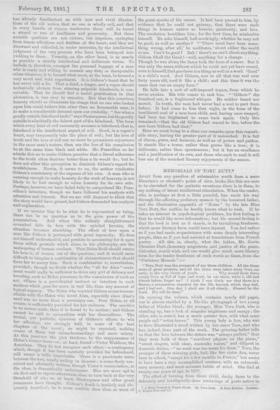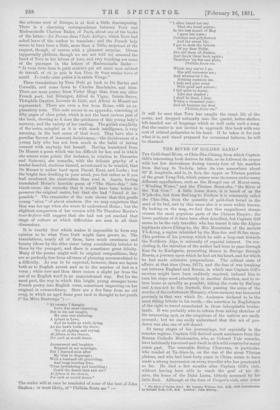MEMORIALS OF TORU DUTT.* APART from any question of substantive
worth from a mere librarian's or student's point of view, books like this are sure to be cherished for the pathetic sweetness there is in them, te say nothing of latent intellectual stimulation. When the reader, who is perhaps at first a little puzzled, has made his way through the affecting prefatory memoir by the bereaved father,. and the illustrative appendix of "Notes " by the late Miss. Torn Butt, the author, he hardly knows what to wish. If he takes an interest in psychological problems, his first feeling is that he would like more information; but his second feeling is that the book is best as it stands, iu its tantalising freshness, which more literary form would have injured. You feel rather as if you had made acquaintance with some deeply interesting
people, than as if you had assisted at translations from French poetry. All this is, clearly, what the father, Mr. Govia Chuuder Butt (honorary magistrate and justice of the peace, Calcutta), would wish, and one would give much mere literary form for the tender frankness of such words as these, from the,
"Prefatory Memoir " :—
" Torn Butt was the youngest of my three children. All the three were of great promise, and all the three were taken away from me early, in the very bloom of youth Why should these three young lives, so full of hope and work, be cut short, while I, old and almost infirm, linger on ? I think I can dimly see that there is a fitness, a preparation required for the life beyond, which they had, and I had not. One day I shall see it all clearly. Blessed be the
His will be done."
On opening the. volume, which contains nearly 400 pages, one is almost startled by a life-like photograph of two young ladies of Hindoo blood ; the younger, Miss Toru Hutt, who is standing up, has a look of singular brightness and energy ; the elder, who is seated, has a much quieter face, with what some people call "artist-brows." This young lady is Amu, who was to have illustrated a novel written by her sister Toru, and who- has, indeed, done part of the work. The grieving father tells- us that the love between the sisters was "always perfect," that they were both of them "excellent players on the piano,"
"sweet singers, with clear, coutralto voices," and diligent in
domestic duties,—" no work was too moan for them." Toru, the younger of these winning girls, had, like her sister Amu, never
been to school, "except for a few months in France," but seems. to have beeu a very accomplished creature, with an extraordi- nary memory, and most accurate habits of mind, She died at
twenty-one years of age, in 1877. The effect of turning from those vivid, dusky faces to the
delicately and intelligently-done renderings of poets native to * A Sheaf Weaned in French Field& By Toru Butt. A Now Edition. London t C. Kegau Paul and Co.
the extreme west of Europe, is at first a little discomposing.
There is a charming correspondence between Torn and Mademoiselle Clarisse Bader, of Paris, about one of the books .of the latter,—La Femme da9i8 l'Inde Antique, which Torn had asked leave of the author to translate ; and the French lady seems to have been a little, more than a little, surprised at the request, though, of course, with a pleasant surprise. Illness (apparently phthisis, though we are not told so) arrested the hand of Torn in her labour of love, and very touching are some of the passages in the letters of Mademoiselle Bader Je vous 6cris dans le petit oratoire qui est aussi mon cabinet de travail, et on je prie le bon Dieu do /oils rendre force et .sant6. Ja confie cette priere ?I, la sainte Vierge."
These translations by Torn Dutt go back to Du Bartas and Corneille, and come down to Charles Baudelaire, and later. There are more poems from Victor Hugo than from any other French poet, but B6ranger, Alfred de Vigny, Sainte-Beuve, Th6ophile Gautier, Leconte de Lisle, and Alfred de Musset are represented. There are even a few from Heine, with an ex- planatory note. This note occurs in an appendix, consisting of fifty pages of close print, which is not the least curious part of the book, showing as it does the quickness of this young lady's memory, and the variety of her reading. The girlish simplicity of the notes, mingled as it is with much intelligence, is very amusing, in the best sense of that word. They have also a ,peculiar flavour of innocent decisiveness,—the decisiveness of a young lady who has not been much in the habit of taking counsel with anybody but herself. Having translated from De Musset a poem which was too difficult for her, and in which she misses some points (for instance, in relation to Descartes and Spinoza), she remarks, with the delicate gravity of a tender-hearted, studious damsel, accustomed to be minded, that De Musset is rather hard upon Pascal, Kant, and Locke ; but the bright face dwelling in your mind, yon feel rather as if you tad overheard the observation than read it. Again, having translated Heine's horrible poem of " The Slave-ship" into blank-verse, she remarks that it would have been better to preserve the original metre, but that she had "found it im- possible." The remainder of the note shows that this gentle young " alien " of about nineteen (for we may conjecture that that was her ago when she wrote it) understood Home; but the :slightest comparison of her version with Sir Theodore Martin's 4our-de-foree will suggest that she had not yet reached that stage of culture at which difficulties are seen in all their dimensions.
It is exactly that which makes it impossible to form any opinion as to what Torn Dutt might have grown to. The translations, nearly all of them, have much sweetness and beauty (those by the elder sister being considerably inferior to those by the younger), and there is sometimes great felicity.
Many of the poems might well be original compositions, they are so perfectly free from all trace of phrasing accommodated to a difficulty. As was to be expected, however, there are lapses both as to English accent and as to the number of feet in a -verse ; while now and then there comes a slight jar from the use of an English word in an unaccustomed way. But for the
most part, the way in which this bright young stranger turns French poetry into English verse, sometimes improving on her original, is extraordinary. Here are a few lines from an old song, in which an aged dame goes back in thought to her youth • (" La Mere Boutemps ")
"At twenty I thought
Love was most charming, But in his net caught, My case was alarming. A tyrant is Love, And be holds us while dying, As the hawk holds the dove; 'Tis all sighing and crying. At fifteen is the chance, For such as would dance.
Amusement and laughter Reigned at my marriage, But I learned soon after My bliss to disparage ; With a husband oft grumbling, And imps howling free, 'Twos bewildering and humbling ; Could the dance then suit me ?
At fifteen is the chance, For such as would dance."
The reader will at once be reminded of some of the best of John Skelton ; or most likely, of" Phillida flouts Kee "
" I often heard her say That she loved posies ; In the last month of May I gave her roses ; Cowslips and gillyflowers And the sweet lily, I got to deck the bowers Of my dear Philly.
She did them all disdain, And threw them back again ; Therefore 'tis flat and plain, Phillida flouts me.
Which way soe'er I go, She still torments me ; And whatsoe'er I do, Nothing contents me. I fade and pine away With grief and sorrow; I fall quite to decay, Like any shadow ; I shall be doad, I fear, Within a thousand year; And all because my dear Phillida flouts me."
It will be seen that Toru has caught the exact lilt of the metre, and dropped naturally into the quaint, helter-skelter, left-handed use of language which so well suits such a song. But the reader is not invited, to approach this book with any sort of critical pedantries in his head, if he takes it for just what it is, and stand prepared for occasional failures, he will be charmed.



































 Previous page
Previous page